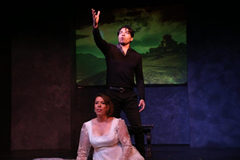| Opera Reviews | 26 April 2024 |
AVA impresses with Rubinstein's rarityby Steve Cohen |
|
Rubinstein: The Demon |
|
|
In recent decades, other pieces by Tchaikovsky have been performed (now using the original Russian language), and the Met has staged 20th-century Russian operas by Shostakovich and Prokofiev. Although that is admirable, older classics have been neglected. What the Academy of Vocal Arts is doing this season is welcome. Anton Rubinstein was a Russian composer from the generation before Tchaikovsky. His symphonies, concerti and operas preceded and influenced what Tchaikovsky wrote. The AVA this month staged Rubinstein’s most famous opera, The Demon. The musical director and pianist was Odessa native Ghenady Meirson, who teaches Russian opera at AVA and also at the Curtis Institute of Music. The opera is derived from a poem by Mikhail Lermontov which was based on the struggle between Mefistofeles and God. The central character, here referred to as The Demon, is a fallen angel who seduces a pure young woman, Tamara. Bored with creating floods and hurricanes to kill people, he yearns for love. When Tamara succumbs to him, she dies and is lifted to heaven, leaving the Demon eternally alone. The story has echoes of Goethe’s Faust, but with the devil romancing a woman personally instead of empowering a surrogate to do so. The Demon presents great challenges and opportunities for the title character. He has wordy monologues, big arias, and a final-act duet where he and Tamara fight for her soul. Three baritones sang the role during the AVA’s three-performance run. Ethan Simpson and Timothy Renner sang with ringing power while Christopher Kenney displayed a smoothly silky baritone voice. As his first step in seducing Tamara, the Demon arranges the murder of her fiancé. Then he tells her how much he relates to her loss. That’s like the apocryphal boy who murdered his parents then asked for leniency because he’s an orphan. One of the fascinations of this opera is that, when he’s wooing Tamara, we almost come to sympathize with him and she comes to think of him as a guardian angel. So sorrowful are his pleas — and so beautiful are the soft passages — that we begin to think that maybe he has changed his evil ways. After she succumbs, however, he boasts that he has won the victory which he sought. Rebecca Gulinello as Tamara was a striking presence with a large voice. It sounds more lyric than dramatic, but with a solid core and a great deal of thrust. The role was sung as other performances by the excellent soprano JoAna Rusche. John Matthew Myers played Tamara’s betrothed very sympathetically, with a voice strong yet tender. Two basses provided solid underpinning: Daniel Noyola as Tamara’s father and Andre Courville as a servant, while Hannah Ludwig and Alejandra Gomez were lower-voiced women in key supporting roles. The Academy has had several resident artists from Russia in recent seasons, but no one in these casts came from there. The native countries of the major singers in this production are Australia, Mexico and the United States. Meirson trained them so their pronunciation and vocal placement were authentically Slavic. Some of the opera’s choruses were trimmed to reduce running time. The choral passages that remained were sung by AVA singers who normally do leading roles, and it was an embarrassment of riches to hear eleven off-stage nuns who were stars in other operas. The first act sounds prosaic, then the second and third develop interestingly in music and drama. Act II features a complex quintet of farewell to the slain fiancé. Act III is almost entirely a duet between the Demon and Tamara as he tries to win her love. The finale is a quiet chorus that welcomes her to heaven. It is much more affecting than the bombastic finales composed by Gounod and Boito for their operas about the devil. This production was a worthwhile enterprise, and should be an inspiration to other companies. The Metropolitan has considered it as a potential starring vehicle for the great Dmitri Hvorostovsky, who currently is battling a brain tumor. Some patrons choose to not attend these once-each-year AVA productions which don’t have an orchestra. It’s their loss. I’ve seen revealing performances of Debussy’s Pelléas et Mélisande and Strauss’s Arabella at AVA with piano accompaniment, to give just two examples. Keep in mind that AVA is a teaching institution and it’s important for students to learn these operas, even when a large orchestra would incur great cost. The Demon was especially rewarding because of its rarity.
|
|
| Text ©
Steve Cohen Photo © Academy of Vocal Arts |

 Russian operas were rarely performed in America until recent years. Before the end of the Cold War, the only pieces you were likely to see were Mussorgsky’s Boris Godunov, which was often sung in Italian at the Met, and Tchaikovsky’s Eugene Onegin which was done there in English.
Russian operas were rarely performed in America until recent years. Before the end of the Cold War, the only pieces you were likely to see were Mussorgsky’s Boris Godunov, which was often sung in Italian at the Met, and Tchaikovsky’s Eugene Onegin which was done there in English.





